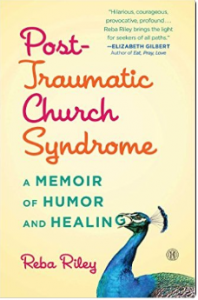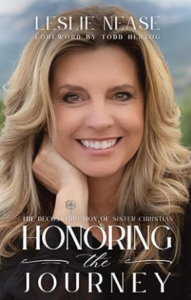 I received a complementary copy of this book for review purposes. The opinions are completely my own based on my experience.
I received a complementary copy of this book for review purposes. The opinions are completely my own based on my experience.
Evangelical Christianity was not working for Reba Riley. Early in her book Post Traumatic Church Syndrome (PTCS) she shares a conversation she had with her Fundamentalist Christian mother. “Jesus is the Way, the Truth, and the Life. No man cometh to the Father but by Him,” her mom said. “You shall know the truth, and the truth shall set you free,” Reba quoted back. “But Mom, that truth didn’t set me free. It imprisoned me. That truth is keeping me away from God because I can’t buy in to all the church crap. And I can’t understand a God who would send people to a fiery pit for eternity. That’s not a God I can believe in.” I liked Reba’s honesty and vulnerability throughout PTCS – she gives the reader a front row seat to her doubting yet seeking soul.
A health crisis led Reba explore other spiritual paths. In PTCS she tells in detail her sampling of 30 religious groups before the age of 30. Serious stuff? Not really – Reba tells her story with humor as she encounters the quirks of various religions. “Find yourself an old lady, or a couple of old ladies, and sit right behind ’em,” her friend Vinnie says when Reba was unsure how to act at a Catholic service. “That way you can watch ’em, so you’ll always know what to do, even if you aren’t paying attention,” Vinnie adds. “Whoa!” Reba says as she enters the massive cathedral. ““If churches were beauty pageant contestants, Catholics would win evening gown every time.”
I was laughing with Reba as she gives details of her quest – visiting such diverse groups as the Scientologists, the Amish, the Hindus, the Omnipresent Atheists, and more. Embedded in the humor were words of wisdom from unexpected sources. In a Hindu temple Reba encounters a fountain in a small meditation room. “This is our monument to the invisible God who cannot be seen, who is too vast to be contained,” her Hindu guide said – a concept of God that resonated with Reba (and with me). I found myself drawn in by Reba’s many entertaining stories, wondering what adventure she would have next (I read the book in three days)
Reba deals with criticism from her fundamentalist Christian friends and family – like being thrown out of a small group Bible Study for asking too many questions (“Your identity just isn’t in Christ” a friend says. “You are being deceived like Eve.” says another). I could relate, as can any former Evangelical Christian who has explored non-traditional spiritual paths. I too was once asked to leave a Fundamentalist Christian Bible Study because of my many questions .
In the end Reba does find a more loving and inclusive spiritual orientation that works for her. She comes to terms with her Evangelical past – seeing that period as a stepping stone for her own growth. Will her version of spirituality work for you? Perhaps, but that’s not the point of the book. Rather through her honest sharing of her own doubts and struggles, Reba encourages the reader to find his or her own answers. To not be afraid to ask questions. To explore. “Rejecting someone else’s version of reality isn’t the same as creating your own,” a friend tells Reba along the way. Like Reba, I’ve moved from following the religion of my youth to creating a spirituality that does work, and I feel reading Post Traumatic Church Syndrome will encourage you to do the same.



